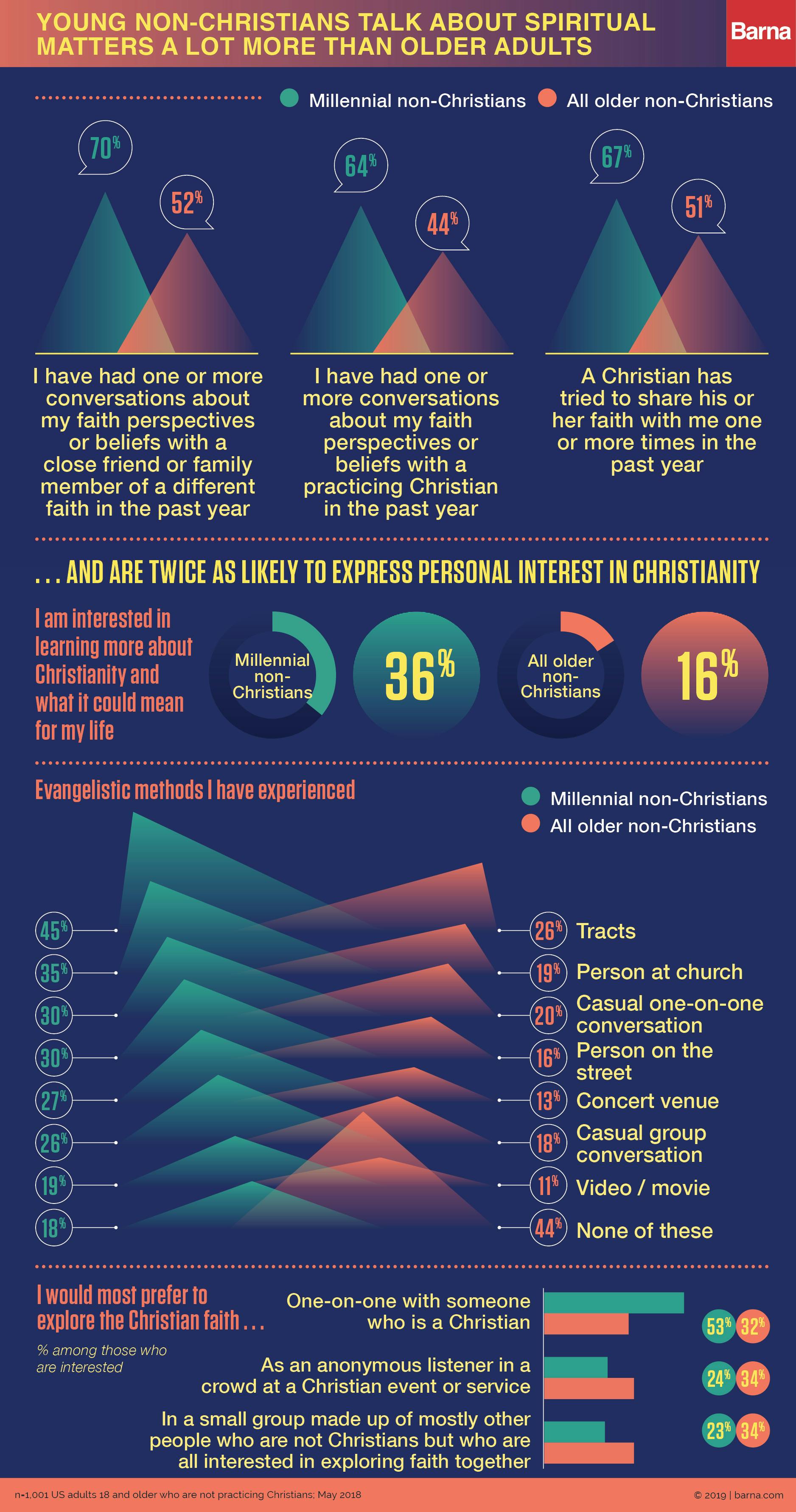Millennial Non-Christians Show Greater Spiritual Curiosity Than Older Adults

Though Christianity remains a powerful force today, its waning influence in American life means that younger generations are coming of age in a country more secular than ever. And with these shifts come challenges to talking about or sharing faith. In fact, Millennials—even those who are practicing Christians—tend to oppose evangelism altogether. But despite the growing indifference, other Barna data suggests an openness to different forms of faith-sharing among the less religious, and a spiritual curiosity among Millennials in particular.
Barna’s recent report Reviving Evangelism, produced in partnership with Alpha USA, shows that Millennials report many more faith conversations or even evangelistic encounters than older non-Christians. Though this could be partly due to the greater diversity that exists for young people among their family and friends, this isn’t the whole story. For at least some young adults, there appears to be deeper interest in spirituality in general, and in Christianity specifically.
As you can see in the infographic below, a few key trends emerge. Millennial non-Christians are much more likely to have had one or more conversations about faith than their older counterparts and are twice as likely to express personal interest in Christianity (26% vs. 16%). They’ve also had much more personal experience with all kinds of evangelistic methods than older non-Christians, including through tracts (45% vs. 26%) or encounters with a person either at church (35% vs. 19%) or on the street (30% vs. 16%). However, their favored method for exploring faith is a one-on-one conversation with a Christian (53%), something only one-third of older non-Christians prefer (32%).
Read a Q&A with Josh Chen, missions director for Cru, from the Reviving Evangelism report.

About the Research
Research for this study included two nationally representative studies of U.S. adults. The first was conducted using an online panel May 8–17, 2018, with 992 practicing Christians. A similar study was conducted online with a nationally representative study of 1,001 U.S. adults who do not meet the criteria for practicing Christians. Both lapsed Christians and non-Christians were interviewed. Both studies have margin of error of ±3 percent at the 95-percent confidence level. Respondents were invited from a randomly selected group of people matching the demographics of the U.S. population for maximum representation. Researchers set quotas to obtain a minimum readable sample by a variety of demographic factors and then minimally weighted the data by ethnicity, education and gender to reflect their natural presence in the known population, using U.S. Census Bureau data for comparison.
Practicing Christians identify as Christian, agree strongly that faith is very important in their lives and have attended church within the past month.
Non-Christians identify with a faith other than Christianity (“religious non-Christians”) or with no faith at all (“atheists / agnostics / nones”).
Photo by Matthew Henry on Unsplash.
© Barna Group, 2019.
About Barna
Since 1984, Barna Group has conducted more than two million interviews over the course of thousands of studies and has become a go-to source for insights about faith, culture, leadership, vocation and generations. Barna is a private, non-partisan, for-profit organization.
Related Posts

What Does it Mean to Be Spiritually Open?
- Culture
- Faith
Lead with Insight
Strengthen your message, train your team and grow your church with cultural insights and practical resources, all in one place.
Get Barna in Your Inbox
Subscribe to Barna’s free newsletters for the latest data and insights to navigate today’s most complex issues.





